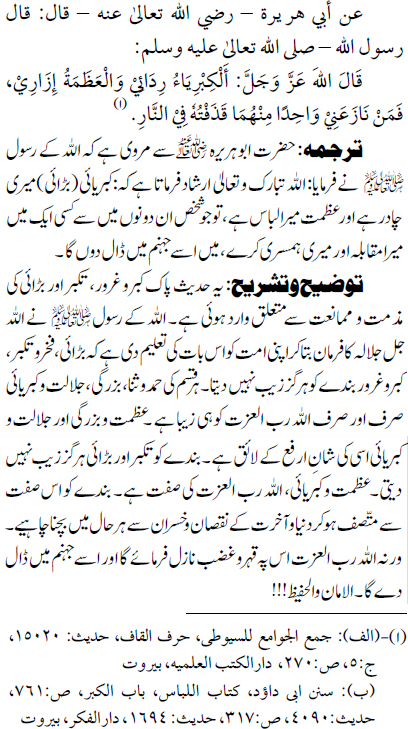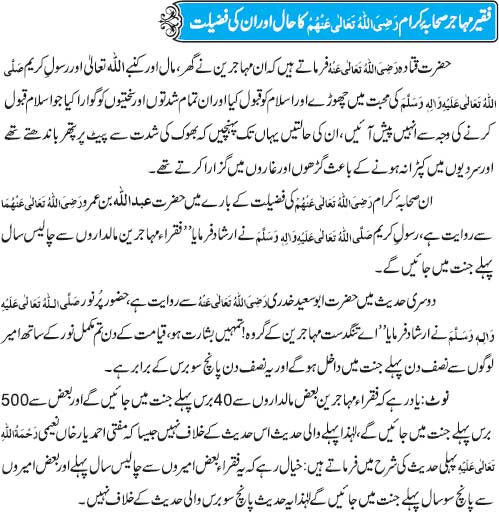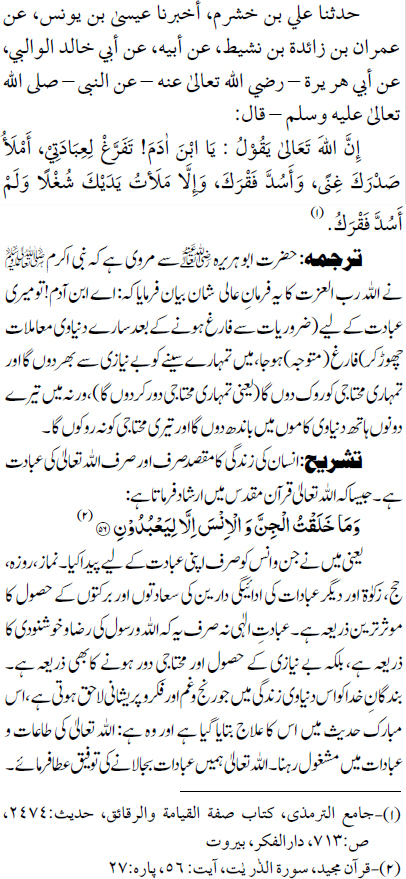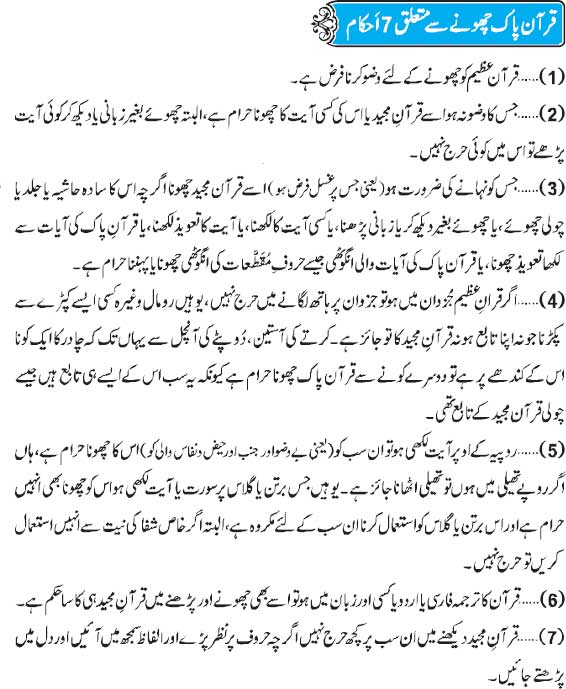
Hadith Qudsi: Takabur Aur Kibr Allah Ki Chadar
No Soul Knows What Rewards Allah Has In Store For It
[Allah’s Quran – 32:17] “No soul knows what Allah has in store for it and for the like of it of rewards that shall be viewed with pleasure and with eyes speaking content in requital of what they achieved and attained, fulfilled and completed, perfected and accomplished”
The Prophet (Peace Be Upon Him) has said :
[Hadith – Muslim, Book #040, Hadith #6783] “Sahl b. Sa’d as-Sa’idi reported: I was in the company of Allah’s Messenger (may peace be upon him) that he gave a description of Paradise and then Allah’s Apostle (may peace be upon him) concluded with these words: There would be bounties which the eye has not seen and the ear has not heard and no human heart has ever perceived them. He then recited this verse:” They forsake (their) beds, calling upon their Lord in fear and in hope, and spend out of what We have given them. So no soul knows what refreshment of the eyes is hidden for them: a reward for what they did”
Gadagari: Ummat Ki Peshani Par Badnuma Dagh

Gadagari: Ummat Ki Peshani Par Badnuma Dagh
Do You Know Who Is Poor Of My Ummah?
[4. Surah An-Nisaa: Ayah 69] And whoever obeys Allah and the Apostle, these are with those upon whom Allah has bestowed favors from among the prophets and the truthful and the martyrs and the good, and a goodly company are they.
[Sahih Muslim : Book 32 Kitab Al-Birr was-Salat-I-wa’l-Adab, Number 6251] Abu Huraira (Radi Allah Anhu) reported Allah’s Messenger (sal-allahu-alleihi-wasallam) as saying:
“Do you know who is poor?”
They (the Companions of the Holy Prophet) said: A poor man amongst us is one who has neither dirham with him nor wealth. He (sal-allahu-alleihi-wasallam) said:
“The poor of my Umma would be he who would come on the Day of Resurrection with prayers and fasts and Zakat but (he would find himself bankrupt on that day as he would have exhausted his funds of virtues) since he hurled abuses upon others, brought calumny against others and unlawfully consumed the wealth of others and shed the blood of others and beat others, and his virtues would be credited to the account of one (who suffered at his hand). And if his good deeds fall short to clear the account, then his sins would be entered in (his account) and he would be thrown in the Hell-Fire.”
My Lord! grant me that I should be grateful for Thy favor which Thou hast bestowed on me and on my parents and that I should do good such as Thou art pleased with, and make me enter, by Thy mercy, into Thy servants, the good ones. |
Faqeer Muhajir Sahaba Ki Fazeelat

Faqeer Muhajir Sahaba Ki Fazeelat
Spreading Salams
“And when you are greeted with a greeting, greet in return with what is better than it, or (at least) return it equally.” (Qur’an, An-Nisa 4:86)
Human interaction is an important facet of any society. In Islam, proper relationships are stressed at all phases of interaction and the common greeting holds a special place in Islamic manners. Allah says in the Qur’an:
“O you who believe! enter not houses other than your own, until you have asked permission and greeted those in them, that is better for you, in order that you remember.” (Qur’an, An-Nur 24:27)
“….But when you enter houses, greet one another with a greeting from Allah, blessed and good….” (Qur’an, An-Nur 24:61)
Too often, we take greetings for granted and attach minimal importance to them. In these verses, however, Allah reminds the Muslims that offering greetings and the manner of the greeting are of utmost importance. Similarly, in a Hadith narrated by Bukhari and Muslim, the Prophet stressed the importance of greetings when he defined the rights of a Muslim:
“The rights of a Muslim upon another are five: returning greetings, visiting the sick, following the funeral procession, responding to invitations, and offering ‘Tashmeet’ for one who sneezes.” (Bukhari and Muslim)
The recommended greeting of a Muslim is to say: “As-salaamu a’laykum” (peace be upon you). According to a Hadith related by Bukhari and Muslims, this form of greeting was ordained by Allah from the time of Prophet Adam (peace be upon him).
The Virtues Of Salam
Exchanging salam holds a high position in Islam. Not only is salam equated with many other important deeds, but it is one of the defining criteria of belief. We observe many Hadiths pertaining to the position of exchanging salaam in Islam.
In one Hadith a man asked the Prophet (PBUH- peace be upon him) about which aspect of Islam was best. The Prophet (PBUH) replied: “Feeding the hungry, and saying salam to those you know and those you don’t know.” (Bukhari and Muslim)
The Prophet (PBUH) also said: “You will not enter paradise until you believe, and you will not believe until you love one another: ‘spread salam’ (the greeting of peace) among you.” (Muslim)
The Prophet Muhammad (PBUH) also explained another virtue of salam in the following Hadith: “When two Muslims meet (give salam), and shake hands, they are forgiven their sins before they part (with each other).” (Abu Dawud)
“O people! spread salaam, feed the hungry, be in touch with your kin, and pray while people are asleep (at night) you shall enter paradise peacefully.” (Tirmithi)
The Grades Of Salam
There are several forms of exchanging salam. Each has its grade which corresponds to the extent of the phrase. There is a Hadith where Imran Ibn Hussayn (may Allah be pleased with him) narrated that: “A man came to the Prophet (PBUH) and said, ‘As-salaamu a’laykum!’ The Prophet (PBUH) returned his greeting and when the man sat down, the Prophet (PBUH) said: ‘Ten.’ Another man came and said: ‘As-salaamu a’laykum wa rahmatullah (may the peace and mercy of Allah be upon you) .’ to which the Prophet also responded, and when the man sat down, He said ‘Twenty.’ Another man came and said: ‘As-salaamu a’laykum wa rahmatullahi wa barakatuh (may the peace, blessings, and the mercy of Allah be upon you).’ The Prophet (PBUH) returned his greeting, and after the man sat down, he said: ‘Thirty.” (Abu Dawud and Tirmithi)
The Hadith has been interpreted to mean that the minimum form of the Islamic greeting which is acceptable is “As-salaamu a’laykum” and one is rewarded with ten good deeds for saying it. The second grade, adding “wa rahmatullah”, raises the reward to twenty good deeds. The best grade of salaam is “As-salaamu a’laykum wa rahmatullahi wa barakatahu”, and this is worth thirty good deeds.
The response to the greeting is similar in form and rewards. The least one could say is “Wa a’layku-mus-salaam” and the best answer is: “Wa alayku-Mus-salaam wa rahmatulahi wa barakatahu” (and may the peace, blessings, and the mercy of Allah be upon you).
In the time of the Prophet (PBUH) the Sahabah (companions of the Prophet ) would compete with each other, to see who could give salaams first.
The Prophet (PBUH) said: “The best of the two persons is the one who begins with salam.” (Related by Nawawi in his book Al-Adkar)
“The Prophet (PBUH) was asked: ‘O Messenger of Allah ! When two persons meet with each other, who should take the lead in greeting the other? He answered: ‘The one who is closest to Allah.” (Tirmithi)
The Prophet (PBUH) said: “The person closest to Allah is the one who precedes others in greeting.” (Abu Dawud)
The Islamic Ruling On Salam
Initiating salams is considered ‘Sunnah’ or optional, returning the salaams after it is offered is considered ‘wajib’ or obligatory, based on the first Qur’anic ayah mentioned. Islam also encourages people to offer the first greeting as mentioned in the Hadiths mentioned previously.
The Prophet (PBUH) was asked about the most appropriate way to give salams as shown in the following Hadith: Anas (may Allah be pleased with him) says that a man asked the Prophet:”O Messenger of Allah when any one of us meets a Muslim brother or a friend then should he bow his head (as a sign of courtesy to him)?’ He said: ‘No.’ The man said: ‘Should he embrace him?’ He said: ‘No.’ The man then asked: ‘Should he clasp his hands?’ He said: ‘Yes.” (Tirmithi)
Unfortunately, now in our community, Muslims have adopted other methods of giving salutations. As we can see in this Hadith, The Prophet (PBUH) was very precise about how salams were to be given.
We as Muslims, should remember that Prophet Muhammad (PBUH) is the best example for us to follow in all aspects of our life, and we should be careful not to add anything new to the Deen of Islam, for fear of implying that the Prophet Muhammad did not complete his mission.
As Allah (Most Exalted is He) says in the Qur’an: “You have indeed in the Messenger of Allah, a beautiful example for anyone whose hope is in Allah and the Last Day.” (Qur’an, Al-Ahzab 33:21)
The Messenger of Allah (PBUH) said: “I have not left anything which Allah (Most Exalted is He) ordered except that I have ordered you with it, nor anything that Allah forbade you, except that I forbade you from it.” (Buhaiqi)
Conditions Under Which Salam Is Discouraged
There are certain situations under which it is preferable not to offer salam. These include; when a person is relieving himself, when one is having a marital relationship, when someone is sleeping, or when in the bathroom.
Offering salam when someone is reciting the Qur’an is permissible but discouraged. The same rule applies to someone who is making dua (supplication) or one who is praying.
Exchanging Salam With Non-Muslim
The Prophet (PBUH) said: “Do not greet the Jews and the Christians with salam.” However, if they salam first, we may reply by saying “wa a’laykum” (and upon you).” (Bukhari and Muslim)
Salutation and Meeting Non-Muslims
Amr bin Shu’aib – Tirmithi: The Messenger of Allah (PBUH) said: “He does not belong to us who imitates people other than us. Do not imitate the Jews or the Christians, for the Jews’ salutation is to make a gesture with the fingers and the Christians’ salutation is to make a gesture with the palms of the hands.”
Ayesha – Bukhari: When some Jews came to the Messenger of Allah (PBUH) and said, “As-saamu ‘a’laikom” (Death be upon you) and he replied, “Wa ‘a’laikom” (and upon you), she (‘A’isha) said, “Death be upon you and may Allah curse you and be angry with you.” The Messenger of Allah (PBUH) then said, “Gently, ‘A’isha, keep to kindness and avoid harshness and coarseness.” She asked if he had not heard what they said, and he asked if she had not heard what he said, saying, “I replied to them, and my prayer regarding them will be answered, but theirs regarding me will not.”
Surah Mujadila:8: “And when they (Non-Muslims) come to thee, they salute thee, not as Allah salutes thee (but in crooked ways).” E.g. As-saamu ‘alaikom.
Abu Hurairah – Muslim: The Messenger of Allah said, “Do not salute the Jews and Christians before they salute you, and when you meet one of them on the road force him to go to the narrowest part.”
Greeting The Youn
It is considered a part of the Sunnah for adults to offer salam to children in order to teach them the proper greeting manners and to build their self-esteem. In both Al-Bukhari and Muslim, Anas (may Allah be pleased with him) narrated that the Prophet passed by some youth and he offered salaam to them. Anas (may Allah be pleased with him) also reported that the Prophet used to do this quite often.
Etiquette Of Salam
There are several etiquettes to be followed with respect to the exchanging of salam. The Prophet (SAWS), for example, said: “The person who is riding should offer salam to the one who is walking, and the one who is walking should greet the one who is sitting, and the smaller group should greet the larger one.” (Bukhari and Muslim)
Aside from the situations mentioned in the Hadith, the one who enters a house should initiate salam to those already there. Furthermore, if one enters his home, it is preferable to offer salam, even if there is no one at home. With respect to the salam between the young and the old, the young are expected to begin the greeting.
It is also considered improper for someone to meet a group of Muslims and offers salam only to some of them. The greeting must be for all in the group. If a group of people offers salam to an individual at the same time, he may reply only once to all of them.
The head should never be bent as a sign of greeting. We bend our heads only to Allah. It must also be emphasized that other body gestures in any form or shape (for example, raising eyebrows, extending the arms, smiling, winking, etc.), cannot replace uttering the words salam.
Salam for someone at a distance can be offered by saying the salam and waving a hand. Waving the hand alone, however, is not considered a salam.
Salam is not only confined to the time of meeting only but extends to when separating as well.
Abu Hurairah (may Allah be pleased with him), relates that the Prophet said: “When one of you joins a gathering, he should greet those present; and when he leaves them he should salute them because the first salutation is not better than the last one.” (Abu Dawud and Tirmithi)
Saying Of The Sahaba Regarding Salam
Umar bin Khattab: “There are three ways of showing sincere brotherly love: give him the greeting of Salaam when you first meet him, make him comfortable, and call him by his favorite name.”
Sa’id bin al-As: “I owe my sitting companion three things: on his approach, I greet him, on his arrival I make him welcome, and when he sits I make him comfortable.”
Conclusion
There are two fundamental categories of human beings: Muslims and Non-Muslims. Any human being who chooses to submit to his Creator is called a Muslim and his way of life is Islam. A Muslim is a precious being in the sight of Allah. Muslim gains special privileges, honor, and dignity because of Islam. They are people (Muslims) who have achieved peace (Salam) by accepting Peace (Islam). The salutation of Salam is a special blessing of Allah for Muslims. The first conclusion is that Muslims should use Salam to salute fellow Muslims because it is only befitting for them to do so.
It is below the dignity of the Muslim to use such expressions below their noble status. The Muslim should not degrade himself, by using Non-Muslim salutations; or his fellow Muslims, by saluting them with Non-Muslim salutations; and nor his Deen al-Islam, by adopting the ways of the Non-Muslims. The second conclusion is that Muslims should not use Non-Muslim salutations amongst themselves because these are unfit for them. Muslims should not only refrain from using Non-Muslim salutations, but they should abhor such practices.
The Non-Muslim human being, a Kafir (dis-believer), is one who chooses to reject the message of Peace and adopt his own anti-Islamic way of life, Kufr. Such beings are in utter discord, and their life is in contradiction with any concept of peace or harmony. These people will never attain the magnanimity of the Muslims, but the contrary, ignominy.
The salutations of these people are likewise only worthy of their status, rather meaningless and unworthy of noble people. They do not deserve the peaceful salutation of Salam because they have chosen to reject it. The third conclusion is that Non-Muslims should not be saluted with the full Salam as they are unworthy of it. They are deprived of the blessings of Salaa as they rejected them. How can a Muslim pray, “Peace be upon you, and Allah’s Mercy and Blessings” for a person who does not believe in Allah or lead his life in accordance with the teachings of Islam, for this dua to become effective for him? The salutation of Salam cannot be used for them.
Allah says in the Qur’an: “It is not fitting for the Prophet and those who believe, that they should pray for forgiveness for the Mushriks (pagans), even though they be of kin after it is clear to them that they are companions of the fire.” (Qur’an, At-Taubah 9:133)
Further: “Muhammad is the Messenger of Allah and those who are with him are hard against the unbelievers, (but) full of Mercy for one another.” (Qur’an, Al-Fath 48:29)
The general conclusions are: the salutation of Salam is for Muslims and the Non-Muslim salutations are for Non-Muslims.
Muslims should not use bad language when saluting Non-Muslims but should be polite and courteous. The wording of the Salutation for the Non-Muslim according to the Qur’an and Hadith should be noted. The ayat in the Qur’an, like all other ayats, is beautiful. The wording is, “Peace on him who is rightly guided.” Although this is used for the Non-Muslims it is in reality, only applicable to those who are rightly guided, the Muslims. The salutation for the Non-Muslims in the Hadith is that the Muslims should say, “Wa ‘alaykum” when greeted by the Non-Muslims. That is, they should say, “The same to you” or “Upon you” concerning whatever Non-Muslims have said.
References:
1. Article, Al Jumuah Magazine, Salam by Rafil Dhafir
2. Riyadh-Us-Saleheen
3. Salaam – Salutation of the Muslims by Ibn Aslam
Hadith Qudsi: Ibadat-e-Ilahi

Hadith Qudsi: Ibadat-e-Ilahi
Is There A Hajj Akbar?
1. Is there a Hajj Akbar?
If Arafat is on a Friday, then many describe it as Hajj Akbar (Big Hajj). There is no big or small Hajj. There is only one Hajj. Every year is Hajj Akbar. The 10th day of Dhul Hijja is described in The Qur’an as Yaum-ul-Hajjil-Akbar.
2. Is it a requirement to enter Masjid Al Haram from the Baab as-Salaam entrance?
There is no such requirement. You can enter from any of the many gates.
3. Can I smoke when I’m in Ihraam?
No. Try to give up this habit for the good of your health and the well-being of your family. Many chain smokers have returned from the Hajj as non-smokers for good. Alhamdulillah.
4. When I stone the jamr’at, is it necessary to hit the target?
It is acceptable if the stone falls into the circle without hitting the target.
5. Can I perform the Hajj every year?
There is no rule prohibiting anyone from performing the Hajj more than once.
If you plan to perform it yearly, you are obviously financially well endowed. You should consider the following. One, there are other things you can do in the way of Allah. Consider contributing your Hajj trip funds to uplift downtrodden Muslims. Two, with nearly 2 1/2 million people converging in The Sacred Land, the Saudi authorities have understandably imposed quotas. Have a heart for those waiting in line to perform the Hajj for the first time. Allow a reasonable time gap before going to perform the Hajj again.
6. Is it a must for a wife to seek her husband’s permission to perform the obligatory Hajj?
Yes. A husband is strongly advised not to object as his wife is seeking permission to perform a duty commanded by The Almighty. Obedience to the command of The Almighty supersedes everything else, including a husband’s objection.
Quran Chonay Kay Ahkam

Quran Chonay Kay Ahkam
Islamic Hijri Calendar
Islamic months begin at sunset, on the day when the lunar crescent is visually sighted. Because of the centuries-old practice of looking for the lunar crescent to determine if the new month has begun, different months start and end on different weekdays in different countries/communities. Usually, a gap of one to three days occurs.
The lunar year is approximately 354 days long, so the months rotate backward through the seasons and are not fixed to the Gregorian calendar. The months of the Islamic year are:
1: Muharram [“Forbidden” – it is one of the four months during which time it is forbidden to wage war or fight]
2: Safar [“Empty” or “Yellow”]
3: Rabia Awal [“First spring”]
4: Rabia Thani [“Second spring”]
5: Jumaada Awal [“First freezing”]
6: Jumaada Thani [“Second freezing”]
7: Rajab [“To respect” – this is another holy month when fighting is prohibited]
8: Sha’ban [“To spread and distribute”]
9: Ramadan [“Parched thirst” – this is the month of Islamic daytime fasting]
10: Shawwal [“To be light and vigorous”]
11: Dhul-Qi’dah [“The month of rest” – another month when no warfare or fighting is allowed]
12: Dhul-Hijjah [“The month of Hajj” – this is the month of the annual pilgrimage to Mecca, again when no warfare or fighting is allowed]

